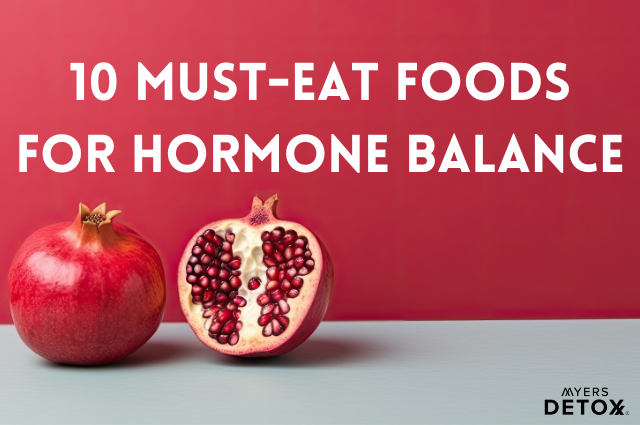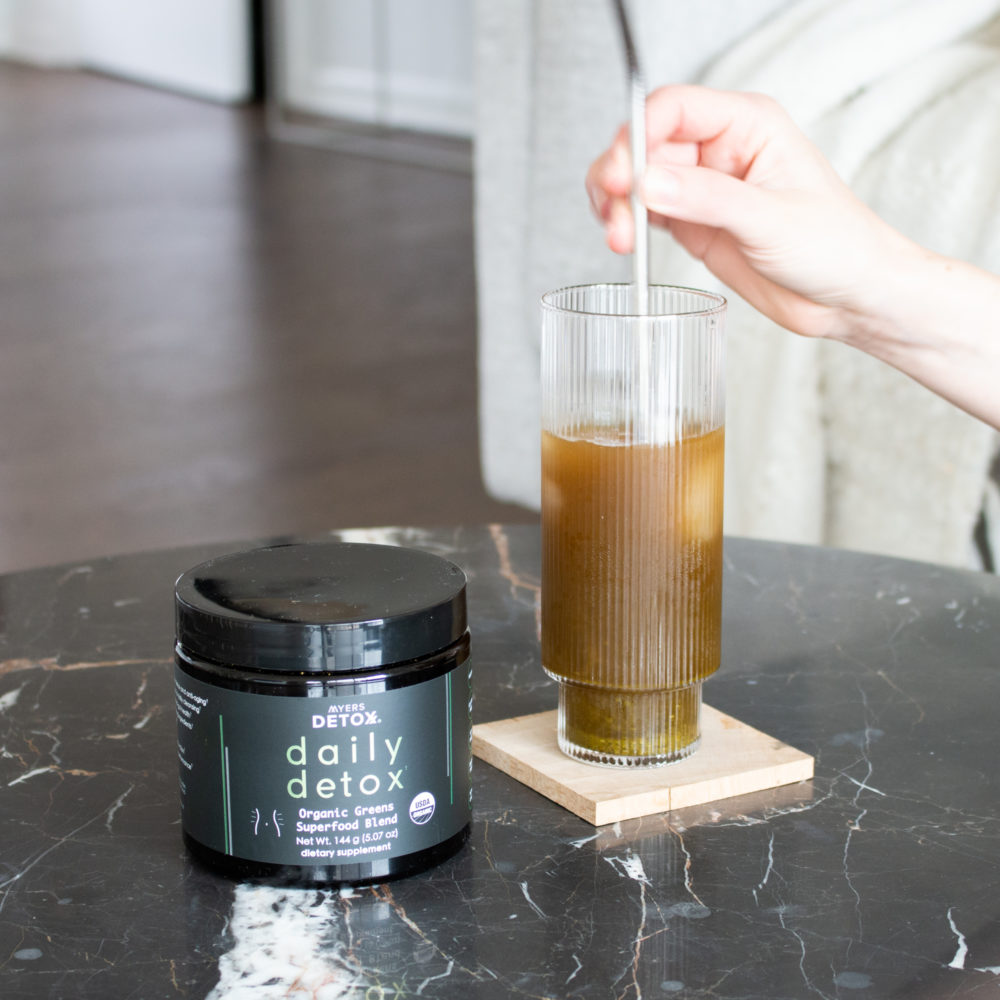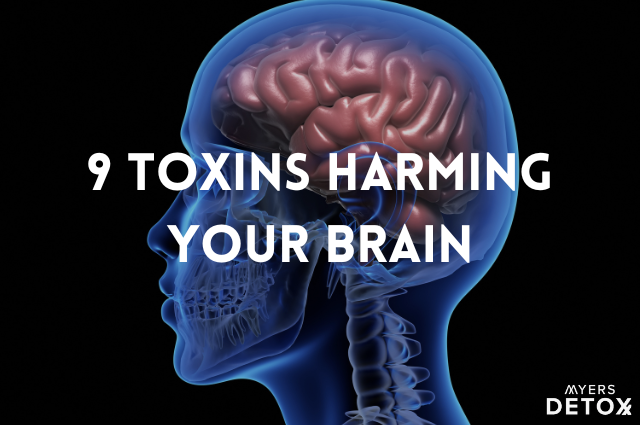In this article, we dive into the 10 must-eat foods you need to incorporate into your diet for healthy hormone balance! Let’s go!
Your hormones, enzymes, and all other metabolites are constantly working in synergy to do their best to maintain homeostasis. This is why issues like hormonal imbalance can cause a cascade of symptoms due to the impact that one imbalance can have on the entire system.
What many people don’t realize is that what you eat plays a significant role in how your hormones behave. The nutrients in your food can impact the clearance, function, and production of hormones either directly or by influencing another pathway, such as detoxification [1].
In this article, you’ll learn:
- How food impacts your hormone levels
- Why proper detoxification is crucial for hormone balance
- Which foods you need to eat daily for optimal hormone health
- Why the quality of your food could make or break hormone balance
The Ten Must-Eat Foods For Healthy Hormone Balance
#1 Flaxseeds
Flaxseeds are a rich source of lignans, a type of phytoestrogen that can help balance estrogen levels in your body. Phytoestrogens have weak estrogenic effects while also displaying anti-estrogenic properties. Research shows that consuming just one tablespoon of ground flaxseeds per day can promote a healthy ratio of estrogen and progesterone — the two primary hormones that play a role in your menstrual cycle[2].
Furthermore, lignans have a similar structure to estrogen, which means that they can dock on estrogen receptors. This can create an anti-estrogenic effect as the lignans block the receptors from receiving estrogen. In hormone-dependent cancers like breast cancers, this effect may reduce the risk of tumor progression by blocking the anabolic (growth) activity of estrogen[2].
Flaxseeds are also a source of omega-3 fatty acids (ALA) and fiber, further supporting healthy estrogen levels. While healthy fats are the backbone for hormone production, fiber is crucial for detoxifying excess hormones as it helps remove excess hormones metabolized by your liver.
The phytoestrogens in flaxseed also appear to assist in the metabolism of excess estrogen, with studies showing enhanced clearance of estrogen in the urine of women who regularly consume flax[3].
Studies focusing on women going through menopause also show positive results with flaxseed consumption. Specifically, research shows that consuming phytoestrogens may positively impact vaginal dryness, hot flashes, and overall quality of life[4][5].
Be sure to grind your flaxseeds before consuming them to get all of the benefits of the phytoestrogens. Unground flaxseeds will largely move through your digestive tract intact and will act as a source of fiber without being absorbed. By grinding the seeds, you will be able to access and absorb all the nutrients available.
#2 Cruciferous Vegetables
Cruciferous vegetables play a very important role in hormone regulation by enhancing the detoxification process. When your hormones become imbalanced and excess levels are roaming around in your body, there is only one way to rebalance your system, and that is through detoxification.
While you have several detox systems in your body, your liver is the primary hub for detox, especially when it comes to hormones.
Unfortunately, due to the high levels of toxins occurring in our environment today, most people’s livers are at maximum capacity. This means that some toxins are likely to build up, whether they be environmental or endogenous toxins like excess hormones.
Cruciferous vegetables like broccoli, brussels sprouts, and cabbage contain compounds called glucosinolates. Glucosinolates break down into indoles and isothiocyanates, which research shows may play a role in enhancing phase one and phase two detoxification enzymes[6][7].
During phase one detoxification, your body breaks down and neutralizes excess hormones and other toxins, while phase two is necessary for the removal of these toxins and their byproducts from your body. Therefore, you need both sides of the equation for the healthy elimination of toxins.
These compounds may also help regulate estrogen receptors’ expression, altering the expression of estrogen and its activity[8].
#3 Seaweed
It may sound like a strange food to add to your diet, but seaweed is one of the most abundant natural sources of the mineral iodine. Why does iodine matter? It’s a crucial building block for your thyroid hormones. T3 and T4 are made of iodine molecules. If you don’t eat enough iodine, you’ll naturally struggle with making enough thyroid hormones.
While all seaweed is mineral-rich, there are only a handful that have particularly high levels of iodine. These include wakame, dulse, and kombu[9].
Most people get their daily iodine allotment from iodized salt (salt that has iodine added), but regular table salt with added iodine is very unhealthy for you. I only recommend consuming sea salt. Seaweed is a much more natural source of this nutrient.
Thyroid hormones don’t get as much attention as the sex hormones (estrogen, progesterone, and testosterone). However, as mentioned in the introduction, all of your hormones are equally important because they all work together in synergy to keep your body in homeostasis[10].
What’s more, it’s estimated that 20 million people in the US have some type of thyroid disorder, with women five to eight times more likely to be diagnosed[11].
Your thyroid is crucial for a myriad of functions, including the metabolism of food, energy production, heart rate, weight maintenance, thermogenesis, and more. Dysfunction in your thyroid may lead to conditions like obesity, hypertension, fatigue, infertility, impaired memory, depression, and metabolic syndrome[12][13].
#4 Prebiotics
Research continues to unveil the benefits of taking probiotics, the healthy bacteria that populate your gut. However, probiotics will do little good for your body if you aren’t taking prebiotics to feed them.
Prebiotics are a type of fiber that your healthy bacteria consume to help them grow and flourish. Some examples include chicory root, Jerusalem artichoke, inulin, garlic, oats, asparagus, and onions.
Prebiotics such as inulin have been shown to enhance the health of your gut barrier (protecting your body from outside invaders), improve immunity, decrease the proliferation of pathogenic bacteria, decrease allergy risk, and increase beneficial strains of bacteria such as Bifidobacteria and Lactobacilli[14].
What does all of this have to do with hormone health?
Your gut plays a vital role in estrogen metabolism, with a group of bacterial cells that are specifically designed to help your body maintain estrogen homeostasis called “estrobolome”. These bacterial species impact both the excretion and the reabsorption and circulation of estrogen. Of course, the health of your estrobolome can be directly impacted by your diet as well as the use of antibiotics. By keeping your gut microbiome healthy, you’re supporting the estrobolome, and therefore the balance of estrogen in your body[15].
#5 High-Quality Protein
Protein is well known as the most satiating nutrient due to its impact on the hormone insulin. Protein is the most challenging of the macronutrients to break down due to its complex structure. Unlike carbohydrates which begin their breakdown in your mouth, protein requires stomach acid before it can enter your small intestine for further metabolism.
This means that when you eat a protein-rich meal, the energy you produce is slow and steady, producing a slow and steady insulin response. Keeping insulin within a healthy range is crucial for blood sugar regulation, but it also has an impact on your sex hormones.
As you’ve learned by now, imbalances in any one hormone can lead to imbalances in others. Research shows that high levels of insulin can increase androgen production in the ovaries. This is often seen in the condition PCOS (polycystic ovarian syndrome) which is characterized by increased androgen production in females[16].
There is a strong correlation between PCOS and type two diabetes due to the role that insulin resistance plays. Therefore, keeping your blood sugar stable with foods that are rich in protein may offer one approach to warding off this hormonal imbalance[17].
With all of that being said, the quality of the protein you eat is absolutely crucial to hormone balance. Factory farmed dairy and meat almost always include added hormones. Conventional farmers use hormones for several reasons, including increased milk production and faster weight gain of animals (higher production)[18]. The primary types of hormones added to conventional animal products include:
- Prolactin
- Estrogen
- Progesterone
- Corticoids
- Androgens
As you can imagine, when you consume these animal products, you’re also consuming the hormones they’ve been given. This throws off your delicate hormone balance and gives your liver even more work to do to clear out the excess.
This is why it’s important to always go for high-quality options like grass-fed beef, organic meats, pastured organic chicken, and pastured organic eggs. Most farmers will also include “hormone-free” on the label when they don’t use hormones. Keep in mind that conventional farmers will never advertise that they do use hormones, so if it says nothing — assume that hormones have been added. Free range also means nothing and can still involve the use of hormones.
#6 Broccoli Sprouts
Broccoli sprouts are a rich source of sulforaphane, a phytonutrient that increases the amount of glutathione in your cells – a potent antioxidant and anti-inflammatory compound. This alone can be hugely impactful to overall health as inflammation is a common root of almost all diseases and imbalances – including infertility[19].
However, sulforaphane may also directly impact hormones due to its role in detoxification, specifically estrogen detoxification. By increasing the process of “sulfation,” sulforaphane promotes a specific detox pathway that enhances the liver’s clearance of excess estrogen[20].
Furthermore, there are several forms of estrogen, some more potentially harmful than others. Studies show that sulforaphane may help shift estrogen production to the more beneficial forms, thus potentially reducing the risk of hormone-related imbalances[21].
#7 Fermented Turmeric
Turmeric is a spice that’s been used for thousands of years as a healing plant in cultures worldwide. Most well-known for its anti-inflammatory activity, research shows that turmeric also contains hormonal-balancing properties.
For example, studies show that turmeric may play a role in alleviating endocrine-related metabolic abnormalities through its influence on androgen hormones and insulin[22].
The active compound in turmeric, curcumin, has been shown to reduce blood sugar, promote healthy weight maintenance, and increase insulin sensitivity in those who experience insulin resistance[23].
Some research also suggests that turmeric may act like a phytoestrogen, helping to restore estrogen levels to a healthy level in those with low estrogen[24].
Animal research also shows that turmeric may help to restore progesterone levels in stressed mice[25]. With psychological stress being a significant contributor to hormonal imbalance, the impact of turmeric here is quite interesting.
#8 Pomegranate
According to what’s known as the Doctrine of Signatures, foods that look like a specific organ or gland often support the health and vitality of that specific organ or gland. There are many examples of the Doctrine, including walnuts, which resemble the brain, or tomatoes, which resemble the heart.
Pomegranates, with their oval shape filled with tiny seeds, are said to resemble the ovaries.
However, these physical similarities are not the only evidence for pomegranates’ role in hormonal health.
Studies show that pomegranate acts as a phytoestrogen in the body – blocking excess estrogen from docking on its receptors. At the same time, this anti-estrogenic effect seems to be targeted only to specific tissues where excess estrogen could be an issue, giving it an almost adaptogen-like property for hormonal balance[26].
In one study, four weeks of treatment with a pomegranate supplement significantly reduced menopausal symptoms in women, including hot flashes, insomnia, headaches, fatigue, nervousness, joint pain, and depression[27].
#9 Beets
Beets are one of those vegetables you may have to spend a little extra time preparing, but when it comes to hormonal health, they’re worth the effort.
Research shows that beetroot consumption can positively impact sex hormone balance, including estrogen, testosterone, and progesterone, and help to regulate the menstrual cycle[28][29].
While the specifics as to how beets can support healthy hormone levels is still under investigation, there are several factors that may contribute.
First, beets are a rich source of vitamin C, which is known to support adrenal health and therefore enhance our ability to deal with stress. With stress being one of the major contributors for hormonal imbalance, getting enough vitamin C in your diet could prove remarkably beneficial for hormone homeostasis[30].
In addition, beetroot contains antioxidants known as betalains which support liver health[31]. One of the contributing factors to hormone imbalance is an inability to detox excess hormones through your liver. By supporting liver health and function, betalains may assist in the removal of excess hormones.
Beets also contain high levels of the trace mineral boron. Studies show that this micronutrient has a positive effect on testosterone and estrogen levels, while also exhibiting an antioxidant effect in the body[32].
#10 Cordyceps
Cordyceps are a well-known medicinal mushroom, most famously recognized for their adaptogenic activity. As an adaptogen, cordyceps support your body’s resilience to stress and improves physical energy – as such, it can do wonders for your hormones[33].
In addition to their impact on stress, cordyceps contain compounds called isoflavones, known for their phytoestrogenic effects. In animal research, isoflavones from cordyceps were able to boost estrogen levels in estrogen-deficient rats that had their ovaries removed. These rats not only showed improved estrogen levels but signs of estrogen-rated bone loss were also improved with the help of cordyceps[34].
Research also shows that cordyceps may help improve and maintain testosterone levels in men with testosterone deficiency[35].
Your Liver, Detoxification, And Hormone Balance
When considering hormonal health, most people go directly to the source – the ovaries, testis, adrenals, thyroid, etc.
While all of these organs and glands are crucial to healthy hormone balance, one organ that often gets overlooked is the liver.
How exactly does your liver play into hormone balance?
While all the glands mentioned above work together to produce hormones, the job of creating hormonal balance via detoxification falls almost entirely on your liver.
Excess hormones (and all other toxic compounds) are detoxified in your liver through two phases, known as phase one and phase two detoxification. During phase one detoxification, hormones are neutralized and converted into substances that are less harmful to the body.
During phase two detoxification, hormones are further transformed into water-soluble substances, making them easier to remove from your body. From here, hormones and other toxins are typically excreted via your kidneys or bowel in urine or feces[36].
This process happens naturally, on its own, every day. So, why are we seeing so many issues with hormonal balance today?
In a world riddled with exogenous sources of hormones (endocrine-disrupting hormones) like those found in factory-farmed meat, plastics, personal care products, and processed foods, your liver’s to-do list is longer than ever[37].
That’s why consuming foods and nutrients that support your liver’s detox pathways can directly impact your hormonal balance and overall health.
Make It Simple: Hormone Balance In A Bottle
Incorporating cruciferous vegetables, prebiotics, flaxseeds, beets, turmeric, broccoli sprouts, pomegranate, cordyceps, and seaweed into your diet on a daily basis can be a little tricky if you’re someone who’s often on the go. Even if you work from home, who has the time to tailor each of their meals around specific foods every day? While I wholeheartedly promote cooking for yourself and meal planning, it can be a challenge when you want to use your food therapeutically and you also have a life to live.
This is one of the reasons that I created Daily Detox. Daily Detox is a powdered organic superfood blend that includes an array of nutrients, including all of the superfoods mentioned in this post (with the exception of protein).
Daily Detox is also strategically formulated with nutrients that support both phase 1 and phase 2 liver detox – so you’re hitting hormonal balance from all angles. All it takes is about 30 seconds every morning to add your powder to liquid (water, juice, or incorporate it into a smoothie), and you’re good to go.
Takeaway
The food you eat plays a direct and important role in the balance of your hormones. In addition to adding in the superfoods mentioned in this article, eliminating inflammatory foods like sugar, trans fats, and highly processed carbs will make a significant difference in the way your body processes hormones.
At the end of the day, you are what you eat. If you want to keep your body happy and healthy, let the quality of your diet lead the way.











